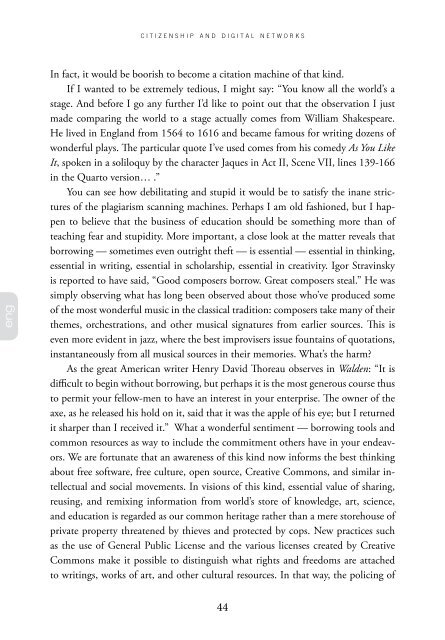Sergio Amadeu da Silveira - Cidadania e Redes Digitais
Sergio Amadeu da Silveira - Cidadania e Redes Digitais
Sergio Amadeu da Silveira - Cidadania e Redes Digitais
Create successful ePaper yourself
Turn your PDF publications into a flip-book with our unique Google optimized e-Paper software.
eng<br />
c i t i z e n s h i p a n d d i g i t a l n e t w o r k s<br />
In fact, it would be boorish to become a citation machine of that kind.<br />
If I wanted to be extremely tedious, I might say: “You know all the world’s a<br />
stage. And before I go any further I’d like to point out that the observation I just<br />
made comparing the world to a stage actually comes from William Shakespeare.<br />
He lived in England from 1564 to 1616 and became famous for writing dozens of<br />
wonderful plays. The particular quote I’ve used comes from his comedy As You Like<br />
It, spoken in a soliloquy by the character Jaques in Act II, Scene VII, lines 139-166<br />
in the Quarto version… .”<br />
You can see how debilitating and stupid it would be to satisfy the inane strictures<br />
of the plagiarism scanning machines. Perhaps I am old fashioned, but I happen<br />
to believe that the business of education should be something more than of<br />
teaching fear and stupidity. More important, a close look at the matter reveals that<br />
borrowing — sometimes even outright theft — is essential — essential in thinking,<br />
essential in writing, essential in scholarship, essential in creativity. Igor Stravinsky<br />
is reported to have said, “Good composers borrow. Great composers steal.” He was<br />
simply observing what has long been observed about those who’ve produced some<br />
of the most wonderful music in the classical tradition: composers take many of their<br />
themes, orchestrations, and other musical signatures from earlier sources. This is<br />
even more evident in jazz, where the best improvisers issue fountains of quotations,<br />
instantaneously from all musical sources in their memories. What’s the harm?<br />
As the great American writer Henry David Thoreau observes in Walden: “It is<br />
difficult to begin without borrowing, but perhaps it is the most generous course thus<br />
to permit your fellow-men to have an interest in your enterprise. The owner of the<br />
axe, as he released his hold on it, said that it was the apple of his eye; but I returned<br />
it sharper than I received it.” What a wonderful sentiment — borrowing tools and<br />
common resources as way to include the commitment others have in your endeavors.<br />
We are fortunate that an awareness of this kind now informs the best thinking<br />
about free software, free culture, open source, Creative Commons, and similar intellectual<br />
and social movements. In visions of this kind, essential value of sharing,<br />
reusing, and remixing information from world’s store of knowledge, art, science,<br />
and education is regarded as our common heritage rather than a mere storehouse of<br />
private property threatened by thieves and protected by cops. New practices such<br />
as the use of General Public License and the various licenses created by Creative<br />
Commons make it possible to distinguish what rights and freedoms are attached<br />
to writings, works of art, and other cultural resources. In that way, the policing of<br />
44


